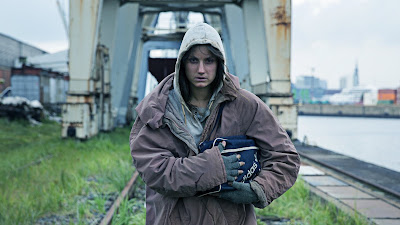TrustMovies had never heard of A TIME FOR DYING prior to receiving the announcement of its imminent appearance in remastered form on DVD from Corinth Films, a distribution company the output of which I've been particularly fond of over the years.
Turns out that this very odd little (it lasts only 76 minutes) western from 1969 -- the last narrative film directed by Budd Boetticher and featuring the final performance of Audie Murphy -- is very much one-of-a-kind.
It's no secret to film fans -- particularly those of westerns -- that Mr. Boetticher (pictured left) was one of the better directors in this once-popular genre. Boetticher was drawn to and had a knack for making the most of stories that highlighted moral questions, together with those oft-times gray areas between right and wrong, evil and good.
This interest gets full play in A Time for Dying, as we note early on a scene in which a sweet bunny rabbit is about to be attacked by a rattlesnake. After the movie's hero (Richard Lapp, shown two photos below) prevents this, he is interrupted by a young man who looks rather villainous (actor Bob Random, shown below and currently making news via the popular documentary, The Other Side of the Wind), who suggests to our hero that the rattler had a right to live, too. Hmmm...
Though the two have only just met -- they're both "new in town" -- only a day elapses before they've gotten themselves "hitched." At the point of a gun. The gunslinger is none other than a certain famous Judge Roy Bean (played with great relish and fun by Victor Jory, below), who takes a liking to these kids, even as he sentences another sweet-looking youngster to be hung by the neck until dead for possibly stealing a horse. ("Don't worry," my spouse noted, "he won't really be dead.") Hmmm again...
By the time you have reached the finale and denouement of what one of our more famous critics, Roger Ebert, called "the damndest and confoundingest western you can imagine" -- I suspect you'll have arrived at a notion that would have pleased the late Mr. Boetticher immensely: It really does not matter how charming or sweet or "good" you might be, people:
Life is mostly shit.
Along the way, not only do we meet that hanging judge, but also Jesse James (played by Murphy, shown above, in his final screen role), Jesse's brother Frank, and their relative, also known (by a pompous-but-not-so-hot filmmaker) as "the coward Robert Ford." Boetticher's take on these famous folk, just as on Judge Bean, is every bit as unusual and enjoyable as is all else in this oddly sweet and darkly satisfying film.
From Corinth Films, A Time for Dying makes its DVD debut this coming Tuesday, February 5. Simultaneously -- already, actually -- the movie is available via Amazon Prime Video and free, for members of that popular streaming service.






















































